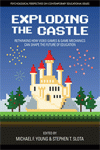
Exploding the Castle
Rethinking How Video Games & Game Mechanics Can Shape the Future of Education
Edited by:
Michael F. Young, University of Connecticut
Stephen T. Slota, University of Connecticut
A volume in the series: Psychological Perspectives on Contemporary Educational Issues. Editor(s): Jonathan Plucker, Johns Hopkins University.
Published 2017
Lacking a digital crystal ball, we cannot predict the future of education or the precise instructional role games will have going forward. Yet we can safely say that games will play some role in the future of K‐12 and higher education, and members of the games community will have to choose between being passive observers or active, progressive contributors to the complex and often political process of weaving together pedagogy, technology, and culture. This will involve agreeing that games—or, more specifically, game mechanics and the engagement in joyful learning that they engender—are not only critical for shaping online and classroom instruction but also the evolution of schooling as a whole. Likewise, it will involve a hard push beyond questions like “Are video games ‘good’ or ‘bad’ for education?” and “Are games ‘better’ for all students than traditional face‐to‐face teaching” to unpack how game experiences vary with individual learner goals as an interaction with the parameters of an educational environment. Simply put, we need to form a cohesive, compelling argument in support of the notion that games are entire learning ecologies in and of themselves.
This edited volume is designed to anchor collective thinking with respect to the value‐added nature of games for learning and the complexities involved in player experience, narrative context, and environmental‐player interactions. As could be expected, we are not interested in debates about “gamification,” game violence, individual game quality, and other topics that have become standard fare in extant games literature. Instead, we seek to emphasize issues of scalability, the induction of player goal adoption, affordances of game‐based instructional environments, relationships between play and transfer, and the value of games as part of an ecopsychological worldview. As long‐time contributors in a field that has made a habit of playing it safe—pun intended—we seek to bring the dialogue in a more nuanced and meaningful direction that will reach teachers, researchers, designers, and players alike.
CONTENTS
Introduction: Castle Upon a Hill, Michael F. Young and Stephen T. Slota. What Homeric Epic Can Teach Us About Educational Affordances of Interactive Narrative, Roger Travis. Structures of Play: Literacy, Games, and Creative Writing, W. Trent Hergenrader. Development: The Role of Digital Games in a Classroom Ecology: Exploring Instruction With Video Games, Amanda Bell and Melissa Gresalfi. More Than an Avatar: Unmasking the Player’s Impact on an Educational Game, Jackie Barnes and Melissa Gresalfi. Ask Not What You Can Do for Badges; Ask What Badges Can Do for You, Peter Samuelson Wardrip and Samuel Abramovich. An Ecocentric Framework for Game‐Enabled Impact: Lessons Learned From the Quest2Teach Project, Sasha Barab and Anna Arici. Educating Digital Natives: Possible and Prospective Futures of Students in Learning Ecologies, W. Ian O’Byrne and Nenad Radakovic. Twist: Measuring and Supporting Learning in Educational Games, Valerie J. Shute, Seyedahmad Rahimi, and Chen Sun. Situating Big Data, Jennifer Dalsen, Craig G. Anderson, Kurt Squire, and Constance Steinkuehler. Conclusion: Distributed Teaching and Learning Systems in the Wild, Jeffrey B. Holmes, Kelly M. Tran, and Elisabeth R. Gee. The Inevitability of Epic Fail: Exploding the Castle With Situated Learning, Stephen T. Slota and Michael F. Young.
-
Paperback9781681239354
Web price: $45.04 (Reg. 52.99)
-
Hardcover9781681239361
Web price: $80.74 (Reg. 94.99)
- eBook9781681239378

- EDU039000 - EDUCATION: Computers & Technology
- EDU029030 - EDUCATION: TEACHING METHODS & MATERIALS: Science & Technology
- EDU051000 - EDUCATION: Learning Styles
-
 Continuous Improvement
A Leadership Process for School Improvement
Continuous Improvement
A Leadership Process for School Improvement
-
 Digital Technologies and Early Childhood in China
Policy and Practice
Digital Technologies and Early Childhood in China
Policy and Practice
-
 Educating the Evolved Mind
Conceptual Foundations for an Evolutionary Educational Psychology
Educating the Evolved Mind
Conceptual Foundations for an Evolutionary Educational Psychology
-
 Innovations in Computational Intelligence, Big Data Analytics and Internet of Things
Innovations in Computational Intelligence, Big Data Analytics and Internet of Things
-
 Instructional Strategies for Improving Students' Learning
Focus on Early Reading and Mathematics
Instructional Strategies for Improving Students' Learning
Focus on Early Reading and Mathematics
-
 Machine Learning, Natural Language Processing, and Psychometrics
Machine Learning, Natural Language Processing, and Psychometrics
-
 The Case of the No Child Left Behind Legislation
Educational Research and Federal Funding
The Case of the No Child Left Behind Legislation
Educational Research and Federal Funding

